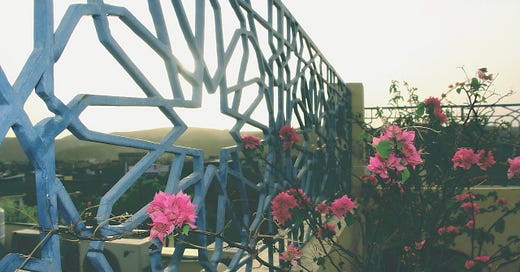Ambassador Deborah Jones still recalls the scent of orange blossoms and jasmine when she stepped off the plane into the darkness in Baghdad. Foreign Service Officer Julie Eadeh remembers the first time she heard the crunch of the Ka'ek, sesame bread, sold in front of the Damascus Gate in the Old City. I understand exactly what they mean. For me, it was the limes mixed with the Mediterranean sea in Beirut; the clean air and wet earth after a thunderstorm in Dar es Salaam, the particular and heavy heat that penetrates your nose and mouth, even at night, in Doha. Scent has always been a welcomed indicator that I have arrived someplace new, if somehow familiar.
“How did you know you’d be at home in the world?” So many questions during an interview require at least some explanation, especially for current and former bureaucrats who are trained in how to speak to the press. But I know when I ask this question, they’ll understand exactly what I mean. And they do.
Their answers will vary, but they will each be able pinpoint that feeling and it is often tied to the familiar sensory overload of being somewhere new, generally the further away the better. In my experience, you’re either born with this desire (this knowing) or you aren’t. Unfortunately, women throughout history haven’t had many opportunities to indulge it. We’ve always had adventurers and explorers. Much later, societies created acceptable modern professions that would suit those of us born with an intrinsic hunger to live and work in the world. I became an international journalist for this very reason. The women with whom I’m in conversation often became diplomats.
If they wanted to live outside the United States, they could have picked any number of jobs. But I know something else about these women: they feel most at home in the world when their occupation depends upon engaging with the people living in it.
Though the women you’ll meet here are often asked what distinguishes them from their male colleagues, they’re quick to point out that many, if not most, of their career motivations are the same. They grew up with a family member in the military or the Foreign Service or they were curious about the opportunity after a stint in the Peace Corps. Some wanted to fulfill a dream that was denied to their parents because of racist and sexist prohibitions. Others had returned from backpacking around Eastern Europe and the Middle East and wanted to get a job that would pay them to set out again. These are all common, even ordinary, reasons. Yet we don’t often associate them as motivating factors of our grandmothers’ and mothers’ generations.
Reporting out a story on the diplomats who advised the 2020 Democrats, I spoke to more than two dozen officials who had left the government over the last two years and many of them were women. Yet during times of crisis, you see the same straight-out-of-central-casting men show up on cable news shows and in the op-ed pages. So I got curious because most of the women I had spoken to had spent 25 or 30 years in the same trenches. Why didn’t I know more about Prudence Bushnell, who joined the Foreign Service around the same time as Nicholas Burns? She served all over the world, including war-torn Baghdad; and she was the ambassador in Kenya when Al-Qaeda bombed the U.S. embassy in Nairobi. She’d been warning about the terrorist threat for more than two years. After the attack, those same warnings were discounted as “overly emotional” by a CIA officer who went to a prominent newspaper with his critique. “Every time I am associated with the bombing, most male interviewers want to put me as the female in distress and the victim,” Bushnell told me last year. “I put the [warning] letter [I’d written] in my book so you can see I was as ‘unemotional’ as you can get.” Last year, Bushnell wrote an account of the bombing. Unfortunately, it went largely unnoticed. It’s hard to tell a certain type of story when you’re fighting the image of a middle-aged man in khakis walking through sand dunes like a modern-day Lawrence of Arabia.
But I want to hear from Pru. I want to hear from all of these women. It’s why I am writing STATESWOMEN, which will come out later this year. And it’s why I am continuing these conversations here at “Our Women in the World.” I hope you’ll join me.





